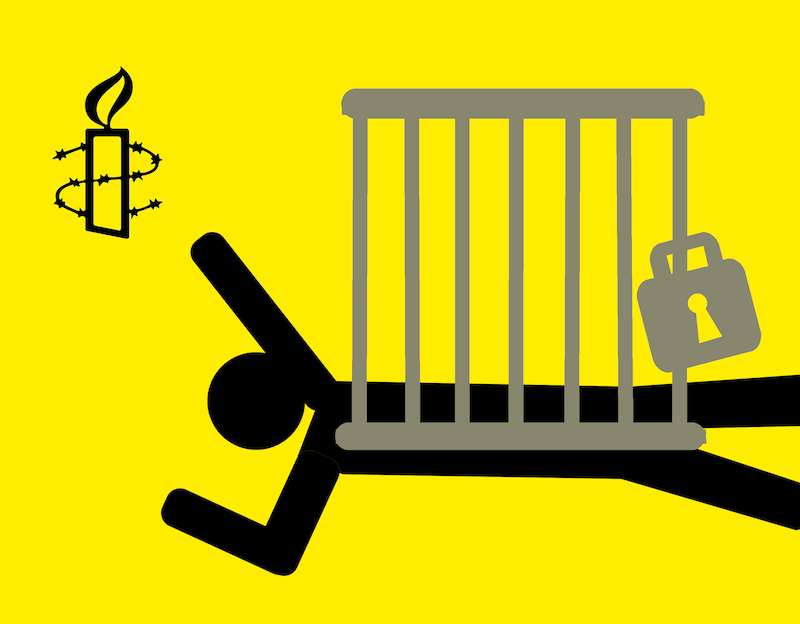Many Canadians around the world remain detained, some denied human rights
Last week, Concordia welcomed back professor Homa Hoodfar after being detained for 112 days in Evin Prison. However, thousands of Canadians still remain incarcerated for unjust reasons and are denied basic human rights, as Hoodfar was.
In fact, as of Feb. 5, 2016, 1,457 Canadians were being detained abroad, according to Global Affairs Canada — 991 in the United States, 237 in Asia and Oceania, 110 in South and Central America, 78 in Europe and 41 in Africa and the Middle East. These numbers include detainees in international jails, prisons and detention centres.
Alex Neve, Amnesty International Canada’s secretary general, said the number of Canadians being detained and denied their human rights has risen in the last decade. “Over the last 10-plus years, there’s been a rapidly growing number of such cases,” said Neve, adding that this is due to a number of factors –– one being that people simply travel more frequently.
Neve said statistics of how many Canadians detained who are experiencing a violation of their human rights and have a risk of being tortured are hard to obtain. The Concordian reached out to Global Affairs for statistics, however they did not respond before the deadline of this article.
Neve said there has also been more unsettlement in the world since 9/11. “There’s a lot of people who are arrested on so-called national security grounds,” said Neve. “Sometimes Canadians have been swept up in that—so it’s starting to become a more regular occurrence.”
Neve said over the past few years there has been more attention brought to Canadians being imprisoned foreignly and more pressure put on the Canadian government regarding their efforts to free Canadians who are imprisoned in foreign countries and face a lack of human rights. He said this increased attention is due to the rising number of Canadians who find themselves in these situations.
“Twenty years ago it had been pretty unlikely that there would be a Canadian who’s actually a prisoner of conscience in another country, or a Canadian who is facing a serious risk of torture in another country,” said Neve.
Jacob Kuehn, Amnesty International Canada’s media and external communications officer, explained that a case only qualifies for Amnesty’s intervention when the individual is a prisoner of conscience—in other words, someone imprisoned solely for exercising their human rights, when there’s no justification for their detention, he said. In such cases, Amnesty will advocate for their release.
In addition, Amnesty advocates for cases where the prisoner is at risk of human rights violations, such as torture or facing the death penalty, even if they are not a prisoner of conscience. “In that case, we’d advocate on their behalf, as well,” said Kuehn. “Not necessarily for their immediate and unconditional release, but certainly for due process.”
Kuehn said Amnesty International Canada advocated for Homa Hoodfar’s immediate and unconditional release from the beginning. “We launched a campaign in the early days calling the government of Canada to become quickly engaged, and then also we had a campaign that got about 50,000 signatures calling for Iranian authorities to release her immediately and unconditionally,” said Kuehn.
Hoodfar’s case was complicated by the lack of diplomatic ties between Iran and Canada. According to Jocelyn Sweet, a Global Affairs Canada spokesperson, this created significant challenges: the Canadian government relied on alliances with the Omani, Italian and Swiss diplomats. Sweet said that the Canadian government is “working on re-establishing diplomatic ties with Iran. We don’t have a specific timeline on it.”
“We have urged that the government should be reforming our laws and policies in what’s known as the area of consular assistance, to strengthen the kind of assistance the government offers in these kinds of cases,” said Neve. Consular assistance is aid and advice provided by diplomatic agents of a country to citizens of the same country that are abroad.
In January 2016, Amnesty International Canada and Canadian-Egyptian journalist, Mohamed Fahmy presented their Protection Charter to Foreign Affairs Minister, Stéphane Dion.
Mohammed Fahmy was incarcerated for more than 400 days in Cairo, Egypt for charges of terrorism. Fahmy’s case did not receive senior-level government intervention. “The [Harper Government], for instance, wasn’t intervening in ways that everyone else felt would be helpful,” said Neve. The Protection Charter would ensure equal and compulsory consular assistance, according to Amnesty International Canada’s website.

“One thing that we have highlighted is that there’s a real need for more consistent and dependable senior-level political involvement in very serious cases like this,” he said. Neve said the release of Kevin Garratt––a Canadian held in China for two years for charges of spying and stealing state secrets––and Hoodfar proves senior level engagement can make a difference. “The prime minister was involved and Minister Dion was involved and probably others, but that’s pretty key, to have your prime minister and your foreign minister both personally intervening,” he said.
Neve proposed two ways the public can assist in the liberation of Canadian prisoners of conscience—call for the improvement of the government’s consular practices and take action on individual cases of concern and to contact their member of parliament and request for them to support The Amnesty International Fahmy Foundation Protection Charter.
Neve said there are other cases Canadians can take action on. “For instance, in Iran, there’s a Canadian permanent resident who’s still in prison,” said Neve. “He’s been in prison for many years, his name is Saeed Malekpour—we’re taking action on his case. There are all sorts of other ways to take action on his case online.”
There’s also Huseyin Celil, who’s imprisoned in China and Bashir Makhtal, who’s imprisoned in Ethiopia, Neve said.
To aid in the release of Canadians incarcerated in foreign prisons who face a risk of violation to their human rights, visit and search the names of detained Canadians for specific details on how to help, visit www.amnesty.ca.
Graphic by Florence Yee




